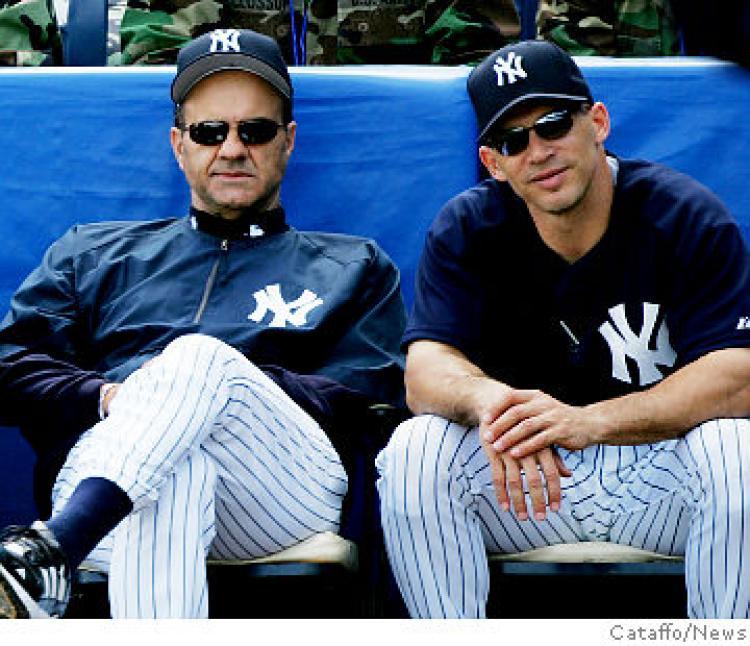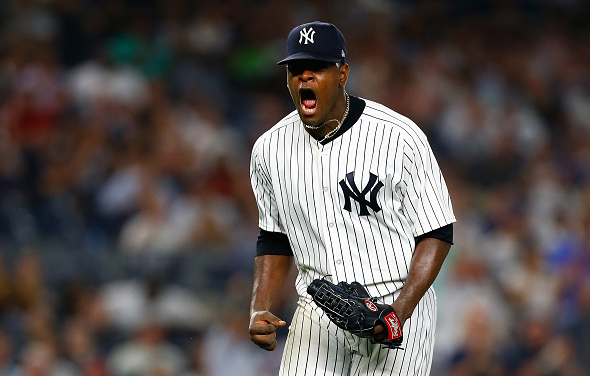Just like with other sports, the man at the helm of a baseball club gets too much credit for the wins and too much blame for the losses. But, more often than not, they don’t get enough credit when it comes to winning championships. The Yankees have had a number of great teams and some of the game’s greatest managers. You need both to win 27 championships and 40 pennants. So, who were the five greatest managers in Yankees history?
Missed It By That Much
This is the toughest choice of all because there could be a number of selections. After an internal debate about three former Yankees players that went on to become managers, Billy Martin, and Ralph Houk were on the outside of the list looking in.
Houk was a two-time Yankee manager as well as their GM. He won a pennant in each of his three seasons in the early 1960’s and two World Series titles. The last championships that Mickey Mantle, Whitey Ford, and Roger Maris would be part of. His second stint as skipper (1966-1973), consisted of the final playing days of Mantle and the start of a bright future with Bobby Murcer, Thurman Munson, and Mel Stottlemyre.
Martin had a brilliant baseball mind, but alcohol, his temper, womanizing, and deeply entrenched insecurities kept him from being as great a manager as he might have been. “Billy the Kid” managed the Yankees on five separate occasions. There’s a widely held belief that had he not been killed in a Christmas Day accident in 1989, Martin would have had a sixth chance to run the Yankees.
Martin’s back-and-forth feuding with Steinbrenner and Reggie Jackson made for great headlines, but it wasn’t healthy for the team or Martin. His brilliance showed through in the pennant winning (1976) and World Series winning (1977) seasons. But then the firings and re-hirings began and things were never the same.
5. Joe Girardi
This choice may come as a surprise, but Girardi is the choice for the fifth greatest manager in Yankees history. Girardi just finished his ninth season as manager of the Yankees. That’s the second-longest streak in the Steinbrenner era, with Joe Torre’s 12 years topping the list.
Girardi got off on the wrong foot in his first season in the Bronx, which was the last season in the old Yankee Stadium. He clashed with reporters and wasn’t truthful about players’ injuries. To make matters worse, the Yankees won 89 games but missed the playoffs for the first time since 1993.
A year later, the team added free agents CC Sabathia, Mark Teixeira, and A.J. Burnett and the won the World Series. Girardi had a much better year, too. His relationship with the press and his players improved. Yes, there are times that he relies too much on his infamous “binder” (it has its own fake Twitter account), but Girardi finds ways to win. He’s led the team to two additional League Championship Series.
There’s an often repeated cliche that managers sometimes do their best job of managing when they have a sub-par team. But, in Girardi’s case, it’s true. He’s done some of his best managing in the last four years. with rosters that were filled with over-the-hill pitchers and players, failed prospects, shaky bullpens, and teams that couldn’t score runs to save their lives. Despite those conditions, the Yankees averaged 85 wins a year.
The Final Four
Things get really tough now, especially deciding between the second and third greatest manager.
Huggins is the least-known among the managerial greats. The reason is twofold. One was the era in which he managed in the Majors, 1913-1929. The second reason is that, sadly, he passed away from sepsis with 11 games left in the 1929 season. He was just 51-years old at the time.
The diminutive Huggins (he’s usually listed at 5’6″ or shorter) was a second baseman for the Cincinnati Reds and a player-manager for the St. Louis Cardinals. He became the Yankees manager in 1918.
Huggins’ and the Yankees’ fortune would soon change with the acquisition of Babe Ruth and the opening of Yankee Stadium. Ruth’s power, unseen before, revolutionized baseball and the Yankees beginning in 1920. The much-maligned franchise began to win on a regular basis. In 1923, Lou Gehrig was added to the lineup and the team won its first World Series title. A dynasty was born.
The fiery Huggins often clashed with Ruth, but he got the best out of his slugger. The apex of Huggins’ career came in 1927. That squad, with its “Murderer’s Row” lineup and great pitching, won 110 of 154 games and is considered by many as the greatest baseball team ever assembled. Huggins started feeling ill in August ’29 and was admitted to the hospital on September 24. He died the next day. The Yankees won five more pennants and World Series in the next decade, and Huggins might have still been the manager. We’ll never know.
The Runners-up
This was a difficult decision to make and one I wavered on. Both candidates for the number two and three spots were worthy of either place. It came down to one difference, which is explained below.
3. Joe Torre
Torre had the longest managerial tenure, by far, under George Steinbrenner. “Clueless Joe” blared the headlines of the NY papers when Torre was hired prior to the 1996 season. But, before long, Torre was beloved by the fans and players. The one-time NL MVP knew what it took to win, and with the Yankees, he finally had the players to win it all.
Four World Series wins in five years and six pennants in eight years, to be exact. Torre’s biggest asset was his cool and steady demeanor. His expression and posture didn’t change in the dugout whether the Yankees were up by five or down by five. Some mistook Torre’s behavior for being asleep at the switch. But, that was never the case.
Torre earned his reputation as an excellent baseball strategist during the 1996-2001 seasons. It seemed like no matter what decision he made, it was the right one. In the first few seasons in the Bronx, Torre did a masterful job of balancing the egos on the team’s roster of top-notch players. The 1998 championship team set a then-AL record with 114 wins.
Torre helped mold young players like Derek Jeter, Mariano Rivera, Jorge Posada, and Andy Pettitte into winners, and got the most out of veterans like Paul O’Neill, Bernie Williams, and David Cone. He finished his Yankees career (1996-2007) with 1,173 wins, the second most in franchise history. That’s more more than half of his Hall of Fame total of 2,326 wins.
During his time with the Bronx Bombers, Stengel got to manage future Hall of Fame inductees Mantle, Ford, Joe Dimaggio, Phil Rizzuto, Yogi Berra, Johnny Mize, and Enos Slaughter. He also mentored stars like Mantle, Bobby Richardson, Tony Kubek, Martin, and others early in their careers.
Stengel won out over Torre for the second spot on the list for one very simple reason: Stengel was the top man in the dugout for a remarkable stretch that saw the Yankees capture 10 pennants in 12 years.
Stengel was thought of as a clown, because of his on and off the field antics, but no clown ever matched his success. He was one of the first managers to platoon players on a regular basis. He would do whatever it took to motivate his players. If that meant talking about them in the press, so be it. If it meant protecting them from the press, he would do that, too.
His famous “Stengelese”, talking in circles and pre-meditated gibberish, could easily distract members of the press, or Congress when called upon to testify before a committee on anti-trust matters (you can read the full testimony on Baseball Almanac). The fans ate it up.
It wasn’t all smooth sailing for Stengel, though. He often clashed with the front office late in his Yankees career. He was reportedly going to be fired after the 1958 World Series, but the Yankees rallied from a three games to one deficit to win the title. It earned Stengel another two years in pinstripes.
Except for the 79-win 1959 season, Stengel’s Yankees never won less than 92 games in the 155-game schedule. Yet, despite all of his success, Stengel’s career was minimized by members of the media, and perhaps some jealous managers, who said that all Stengel had to do was “fill out the lineup card”. Much of this was said when he managed the horrible expansion New York Mets teams in the early 1960’s.
One thing is certain, Casey Stengel will always be one of Major League Baseball’s most beloved figures.
And The Winner Is…
1. Joe McCarthy
If you were around when Phil Rizzuto was a Yankees broadcaster, you would know how highly “the Scooter” thought of McCarthy. He was the greatest Yankees manager and one of the greatest in all of baseball history. He was the first manager to win pennants in both leagues. Rizzuto often credited McCarthy for making him the great ball player he was. He was a tremendous teacher and mentor and knew how the game should be played and executed. McCarthy was a manager that was always several steps ahead of the guy in the other dugout.
McCarthy is the only member of this list that never played Major League baseball, though he did have a long minor league career. It led to his first Major League job as manager of the Chicago Cubs. His 1929 squad had the chance to be the first Cubs team to win a World Series since 1908 but lost in five games to the Philadelphia Athletics. The team included the great Rogers Hornsby and Hack Wilson, who set an NL record with 159 RBI.
Huggins’ early demise opened up an opportunity and McCarthy became the Yankees manager two years later, in 1931 (Former pitcher Bob Shawkey served as manager for one season in between).
McCarthy had the longest reign in Yankees history – 16 years – and a franchise-best 1,460 wins. McCarthy’s Yankees teams encompassed the latter part of Ruth’s career, the middle of Gehrig’s career, and Dimaggio’s rookie season. The McCarthy-led Yankees swept his former Cubs’ team to win the 1932 World Series and won four straight titles from 1936-1939. They added two more to his resume in 1941 and 1943. The 1942 pennant winners were the only team that lost in the Series. McCarthy was fired by ownership 35 games into the 1946 season. He finished his managerial career with the Red Sox for 2-1/2 years. The Red Sox won 96 games in consecutive seasons but finished second in the AL to the eventual World Series winners (Cleveland and the Yankees) each time.




